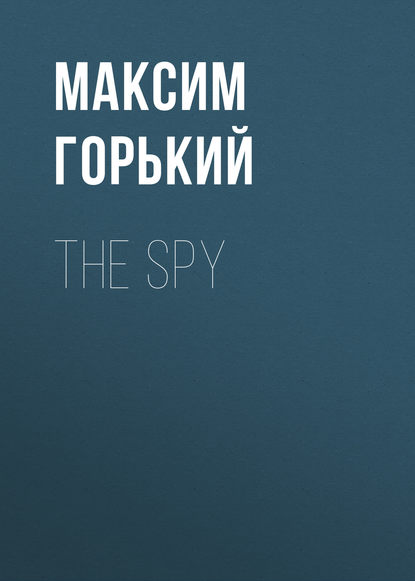По всем вопросам обращайтесь на: info@litportal.ru
(©) 2003-2024.
✖
The Spy
Настройки чтения
Размер шрифта
Высота строк
Поля
"It will pass away."
But Yevsey could not make out whether he still believed in the phrase, or had already ceased to believe in it and was merely saying it to himself for the sake of saying it.
CHAPTER IX
In the morning Rayisa half dressed, with a kneaded face and dim eyes, gave Yevsey his coffee without speaking to him. Dorimedont coughed and spat in her room. Now his dull voice began to sound even louder and more authoritative than ever. At dinner and supper he munched noisily, licked his lips, thrust his thick tongue far out, bellowed, and looked at the food greedily before he began to eat. His red pimply face grew glossy, and his little grey eyes glided over Yevsey's face like two cold bugs, unpleasantly tickling his skin.
"I know how hard life is, brother," he said. "I know what's what. I know what a pound of good and what a pound of bad is worth to a man, yes, siree. And you had good luck to come to me at once. Here I have placed you in a position, and I am going to push you farther and farther to the highest point possible – if you aren't a fool, of course."
He swung his bulky body as he spoke, and the chair under him groaned. Yevsey as he listened to his talk felt that this man could force him to do everything he wanted.
Sometimes the spy announced boastfully in self-applause:
"I received thanks again to-day from my chief Filip Filippovich. He even gave me his hand."
Once at supper Dorimedont pulled Yevsey's ear and began a recital.
"About two months ago I was sitting in a restaurant near a railroad station, and I saw a man eating cutlets. He kept looking around and consulting his watch. You must know, Yevsey, that an honest man with an easy mind doesn't glance around in all directions. People do not interest him, and he always knows the time. The only persons who look about for people are the agents of the Department of Safety and criminals. Of course, I kept my eye on the gentleman. The suburban train pulled in, another little gentleman comes into the restaurant, a dark fellow with a little beard, apparently a Jew. He wore two flowers in his buttonhole, a red and a white one – a sign. I see them greet each other with their eyes. 'Aha!' thinks I. The dark man ordered something to eat, drank a glass of Selters, and walked out. The one who had been in the restaurant first followed him leisurely, and I after them."
Dorimedont puffed up his cheeks, and then blew a stream of air steeped with the odor of meat and beer into Yevsey's face. Yevsey ducked his head, and the spy burst out laughing. Then he belched noisily, and continued raising his thick finger.
"For a month and twenty-three days I tracked the two men. Finally I reported them. I said I was on the track of suspicious people. They went away, and came back again. Who are they? The fair-haired fellow who had eaten the cutlet said, 'It's none of your business.' But the Jew gave his real name, and on inquiry it turned out we needed the man. Along with him we took a woman known to us – the third time she fell into our hands. We went to various other places, picked the people up like mushrooms. But we knew the whole gang. I was a good deal put out, when suddenly yesterday the fair-haired man gave us his name. He turned out to be an important fellow escaped from Siberia. Well, well, New Year I am to expect a reward."
Rayisa listened looking over the spy's head, while she slowly chewed a crust of bread and bit off little pieces at a time.
"You catch them, and catch them, but they're not exterminated," she said lazily.
The spy smiled, and answered impressively:
"You don't understand politics. That's why you talk nonsense, my dear. We don't want to exterminate these people altogether. They serve as sparks to show us where the fire really begins. That's what Filip Filippovich says, and he himself was once a political, moreover, a Jew. Yes, yes. It's a very sharp game."
Yevsey's gaze wandered gloomily about the contracted room. The walls papered in yellow were hung with portraits of Czars, generals, and naked women. These motley, obtrusive spots fairly cut the eyes, recalling sores and wounds on the body of a sick person. The furniture, smelling of whiskey and warm, greasy food, pressed close against the walls, as if to withdraw from the people. The lamp burned under a green shade, and cast dead shadows upon the faces.
For some reason Yevsey recollected the old sickly flat-nosed beggar with the restless eyes of a sharper, whom he met almost every day on his way to the office. The beggar pretended to be a jolly fellow, and would chant garrulously as he stretched out his hand for alms:
"Stout of body, red of nose,
Pining for the want of booze;
Prithee, help God's pilgrim true,
Charity to whom 'tis due!
Help my burning thirst to slake,
Rum, oh rum, for the Lord's sake!"
The spy put his hand across the table, and pulled Yevsey's hair.
"When I speak, you must listen."
Dorimedont often beat Klimkov. Though his blows were not painful, they were particularly insulting, as if he struck not the face but the soul. He was especially fond of hitting Yevsey on the head with the heavy ring he wore on his finger, when he would knock the boy's skull so that a strange dry cracking sound was emitted. Each time Yevsey was dealt a blow Rayisa would say indifferently, moving her brows:
"Stop, Dorimedont Lukin. Don't."
"Well, well, he won't be chopped to pieces. He has to be taught."
Rayisa grew thinner, blue circles appeared under her eyes, her gaze became still more immobile and dull. On evenings when the spy was away from home she sent Yevsey for whiskey, which she gulped down in little glassfuls at a time. Then she spoke to him in an even voice. What she said was confused and unintelligible, and she frequently halted and sighed. Her large body grew flabby, she undid one button after the other, untied her ribbons, and half-dressed spread herself on the armchair like sour dough.
"I am bored," she said shaking her head. "Bored! If you were handsomer, or older, you might divert me in my gloom. Oh, how useless you are!"
Yevsey hung his head in silence. His heart was pricked with the burning cold of insult.
"Well, why are you staring at the floor?" he heard her sad complaining. "Others at your age would have started to love girls long ago; they live a living life. While you – oh, how irresponsive you are!"
Sometimes, after she had drunk whiskey, she drew him to herself, and toyed with him. This awoke a complex feeling of fear, shame, and sharp yet not bold curiosity. He shut his eyes tightly, and yielded himself silently, involuntarily, to the power of her shameless, coarse hands. The weak, anæmic boy was oppressed by the debilitating premonition of something terrible.
"Go to bed, go! Oh, my God!" she exclaimed, pushing him away, dissatisfied and disgusted.
Yevsey left her to go to the anteroom in which he slept. Gradually losing the undefined warm feeling he had for her, he withdrew into himself more and more.
As he lay in bed filled with a sense of insult and sharp, disagreeable excitement, he heard Rayisa singing in a thick cooing voice – always the same song – and heard the clink of the bottle against the glass.
But once on a dark night when fine streams of autumn rain lashed the window near his room with a howl, Rayisa succeeded in arousing in the youngster the feeling she needed.
"There, now," she said, smiling a drunken smile. "Now you are my paramour. You see how good it is? Eh?"
He stood at the bed also intoxicated of a sudden. His feet trembled, he was out of breath. He looked at her large, soft body, at her broad face spread in a smile. He was no longer ashamed, but his heart was seized with the grief of loss, and it sank within him outraged. For some reason he wanted to weep. But he was silent. This woman was a stranger to him, unnecessary and unpleasant; all the good kind feelings he had cherished for her were at one gulp swallowed up by her greedy body, and disappeared into it without leaving a trace, like belated drops in a muddy pool.
"We'll live together, and we'll give Dorimedont the go-by, the pig."
"But won't he find out?" inquired Yevsey quietly.
"Oh, you little coward, come here!"
He did not dare to refuse, but now the woman was no longer able to overcome his enmity to her. She toyed with him a long time, and smiled with an air of having been offended. Then she roughly pushed his bony body from her, uttered an oath, and went away.
When Yevsey was left alone he thought in despair.
"Now she will ruin me. She'll store this up against me. I am lost."
He looked through the window. Something formless and frightened throbbed in the darkness. It wept, lashed the window with a doleful howl, scraped along the wall, jumped on the roof, and fell down into the street moaning and wailing. A cautious seductive thought stole into his mind.
"Suppose I tell Kapiton Ivanovich to-morrow that she suffocated the old man!"
The question frightened Yevsey, and for a long time he was unable to push it away.
"She will ruin me, one way or the other," he answered himself. Yet the question persistently stood before him beckoning to him.
In the morning, however, it seemed that Rayisa had forgotten about the tragic, violent incident of the night before. She gave him his bread and coffee lazily and with an indifferent air. As always, she was half sick from the previous day's drinking. By neither word nor look did she hint of her changed relation to him.
He left for the office somewhat calmed, and from that day he began to remain in the office for night work. He would walk home very slowly so as to arrive as late as possible, because it was difficult for him to remain alone with the woman. He was afraid to speak to her, dreading lest she remember that night when she had destroyed Yevsey's feeling for her. Feeble though it had been, it had yet been dear to him.

















